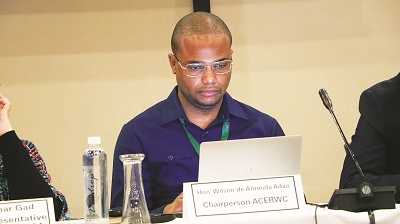By: Koena Mokobocho
During day four of the 43rd Ordinary Session of the African Committee of Experts on the Rights and Welfare of Children, at Avani Lesotho, Director of Programmes at African Child Policy Forum (ACPF) Shimelis Tsegaye Tesemma gave a report on child wellbeing for the year 2023.
Dedicated to child hunger and the issues of poverty within the household, the report outlines the progress of African countries and the subsequent effect it has had on its people. The report explores the main reasons behind the alarming numbers of hungry and poor children, and the solutions various governments are implementing to effectively alleviate the problem.
Roughly 54% (352 million) of children in Africa are living in poverty. 60% of those children are experiencing severe forms of poverty, mainly the deprivation of food which has led to malnutrition, leaving most kids stunted.
The inability to access education is another main contributor alongside poor housing, inability to access sanitation facilities, and safe drinking water.
Despite how dire things appear, there is still hope.
Doctor Shimelis Tsegaye Tesemm advises that Africa restructure the way it uses resources and prioritize efficiency. He provides instances of best practices, such as the high import taxes on tobacco and alcohol in Algeria, which have supported the funding of child-sensitive social protection programs.
In Egypt, the Beladi bread subsidy has been effective in combating hunger; recipients have the right to five loaves of bread each day at a cost that is only 10% of the market price.
Doctor Shimelis lists four crucial measures that governments should prioritize to give a fighting chance as he wraps up his presentation; Africa’s nations must declare child malnutrition and hunger a national emergency and take the appropriate action to put an end to it.
To appropriate funding for child development, development planning should incorporate and recognize the rights of children.
Lastly, the creation of social protection programs that are responsive to the needs of all children and the reinforcement and accountability of government.
The urgent need for action is more apparent than ever as the 43rd Ordinary Session of the African Committee of Experts on the Rights and Welfare of Children comes close to an end. The study that Dr. Shimelis Tsegaye Tesemma presented illuminates the reality that millions of African children have to deal with every day—poverty and starvation.
However, in the face of these severe obstacles, there remains hope reinforced by innovative approaches and a clear call to action. African countries have a responsibility to take this appeal seriously, to put their children’s welfare first, and to pave the way for a time when every child goes to bed with a full stomach, and their minds healthy and to curate effective solutions.


